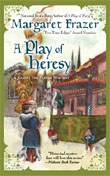CHAPTER 5
Before he went his way, Will Sendell offered to come for Joliffe late in the afternoon, to take him where his company (said somewhat scornfully) would have their practice. He added, “If we’re somewhat before the others, you can have chance to look through the script, to see if there’s aught to be done with it.”
Chapters 5 and 6 are taken up with Joliffe’s first involvement in the play that’s mainly his through the rest of the book. Under the guise of the rehearsal, I slip in our first acquaintance with people later vitally involved in the story. That said, though, I have to admit I greatly enjoyed the chance to blend in some finer points of medieval stagecraft.
Because of that, questions can arise over just how likely it was that medieval players brought the degree of skill to their work as Joliffe and Sendell show here and require of their fellows. Besides the evidence of the plays themselves, requiring a high level of acting skill to make them effective, we have documentation from the time that shows how acting was seen as a complex and demanding skill.
At its most basic is the hope expressed in one play that the players’ “pronunciation of what they are to say here may be firm and sure, and no bad delivery [of lines] obscure the matter.” (Something devoutly hoped by all directors to this day.) In another play are the instructions “And let Adam himself be well instructed when he must reply, lest in replying he be either too quick or too slow. Let not only Adam, but all the persons be so instructed, that they shall speak coherently, and make gestures agreeing with the thing they are speaking of; . . . and to the metre of the verse let them neither add nor subtract a syllable, but let them pronounce every thing clearly; and let those things that are to be said be said in their due order.” Obviously someone had had to deal with players both insufficiently professional and far too free-form in their playing.
Even more telling is an ordinance recorded by the city of York for April 1476 as part of readying for their great cycle of Corpus Christi plays. It decrees that “…yearly in the time of Lent there shall be called afore the Mayor … four of the most cunning [skilled], discrete, and able players within this city to search here and examine all the players and plays and pageants throughout all the artificers belonging to the Corpus Christi play, and all such as they shall find sufficient in person and cunning [skill] to the honor of the city and worship of the said crafts for to admit and able and all other insufficient persons either in cunning, voice, or person to discharge, remove, and avoid [dismiss].”
As William Tydeman well-observes in English Medieval Theatre: 1400-1500, if skill, voice, and appearance “were the three qualities felt to be essential for players in York in 1476, these may well be the criteria which were applied to the field of medieval acting as a whole.”
And so, firm in agreement that if this level of skill was expected of amateurs, an equal or higher one would be demanded of professionals, I set Joliffe and Sendell to coaching their fellows, neatly giving cover to whatever authorial machinations I might be perpetrating the while.
– Margaret
Sources
Robinson, J.W., “Medieval English Acting”, Theatre Notebook, vol. 13 (1959), p.86
Tydeman, William. English Medieval Theatre: 1400-1500. 1986. p.183
Follow the virtual bookclub for A Play of Heresy on Facebook and Twitter.
















